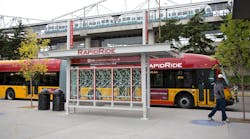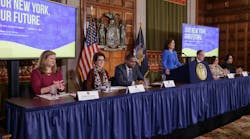OP-ED: MTA's $4.3 billion Second Avenue Subway local share for the FTA $7.7 billion FFGA is still missing
The New York Metropolitan Transportation Authority's (MTA) proposed $64 billion 2025 - 2029 Five Year Capital Plan was recently approved by the MTA Board. It did not contain any new funding toward the MTA's legally required $4.3 billion local share against the Federal Transit Administration's (FTA) $7.7 billion ($3.4 billion federal share) Second Avenue Subway Full Funding Grant Agreement (FFGA) approved in late 2023.
As of Nov. 1, it will be 11 months since MTA Chairman Janno Lieber announced suspension of this project. New York Gov. Kathy Hochul placed implementation of congestion pricing on pause. Hochul promised to lift the pause some time between January 2025 and adoption of the next New York State budget on April 1, 2025. Hochul has also suggested that congestion price tolling might be reduced.
You have to wonder why this hasn't already had consequences on preserving $3.4 billion in FTA funding as part of the FTA/MTA $7.7 billion Capital Investment Grant (CIG) FFGA to finance the Second Avenue Subway Phase 2.
This ongoing delay in implementation of congestion pricing could lead to the loss of $3.4 billion in FTA funding toward the $7.7 billion Second Avenue Subway Phase 2 project.
The FFGA signed by the U.S. Department of Transportation (USDOT) Secretary Pete Buttigieg and the MTA in 2023 contains the following, “In the event there is a problem with providing the legally required $4.3 bill local matching share...” language as paragraph (e) of section 10 of the agreement: (e) "The Grantee agrees to notify the government of any change in circumstances or commitments that adversely affect the grantee’s plan to fund the project costs necessary to complete the project as set forth in the financial plan. In its notification, the grantee shall advise the government of what actions it has taken or plans to take to ensure adequate funding resources and shall reaffirm its commitment to the Government as set forth in Paragraph (b) of this Section 10.”
Did the MTA ever submit any official notification to the FTA concerning the current status for its required $4.3 billion local share? If so, what was the FTA response? What is the current status for the MTA response? What follow up has the FTA taken?
We have never closed the loop on Gov. Hochul's August 2024 announcement that the MTA will proceed with a $182 million project contract. This contract would pay for prior pre-construction relocation of underground utilities contract as part of phase 2.
We have never seen some of the missing critical details. The MTA, to date, has failed to identify the source for $128 million to fully fund this contract. No funding was provided under the proposed MTA $68 billion 2025 - 2029 Five Year Capital Plan to make up for this shortfall.
This contract only represents one percent of the total project cost. The MTA's receipt of $54 million to advance the project is a drop in the bucket. The balance of the missing $4.25 billion MTA local share is needed for the real work. This includes major contracts for tunneling, construction of three stations, including escalators and ADA required elevators, track, power and signal contracts.
By placing congestion pricing on pause, it has resulted in a failure to proceed with advancing the project after eleven months. This could end up with FTA de-obligating its $3.4 billion in funding and closing out the grant.
Did the FTA ever respond to Hochul's action by placing a hold on any drawdowns against the FTA’s FFGA? Is it ethical, let alone legal, to allow the MTA to ask FTA for and receive financial reimbursement for any project expenses when they have continued to fail in providing the legally required matching local funds?
The FTA canceling the FFGA would result in the MTA losing a total of $3.4 billion in discretionary federal funding. To date, the FTA has only approved $340 million in the approved FFGA. It would be amended over the next seven years at $497 million annually until all $3.4 billion in federal dollars were obligated under the FFGA. The FTA also previously provided $450 million in pre-2014 FFGA funding toward this project.
Never in the FTA history have they had to cancel any FFGA due to the recipient being unable to come up with the legally required matching local dollars after approval. Never in the MTA history has the MTA lost the FTA funding due to reneging on providing its legally required matching local share in any approved FTA grant. Lieber would be the first MTA Chairman to do so and would have egg on his face.
Have both USDOT and the MTA Office of Inspector General (OIG) been monitoring the FTA to ensure that the agency enforces all legal requirements, as contained in the FTA $7.7 billion Second Avenue Subway Phase 2 MTA CIG FFGA? Ditto for the MTA OIG and MTA in meeting its legal requirements.
Does someone have to file a Freedom of Information Act Request with both the MTA and the FTA to determine if both parties are following the rule of law? The only way to determine what has taken place between the MTA and FTA since January 2024 over the past year is to see all the emails and written correspondence between the FTA and MTA, FTA Independent Engineering Project Management Oversight monthly reports and the MTA responses to issues and concerns raised along with all Transit Award Management Report MTA Quarterly Financial and Milestone FFGA Progress Reports submitted to the FTA.
Both President Joe Biden and Gov. Hochul promised to conduct the most transparent and open administrations in history. Will they instruct both FTA and MTA to make this information public so that commuters, taxpayers and project advocates can understand what has transpired to date?

Larry Penner
Larry Penner is a transportation advocate, historian and writer who previously served as a former director for the Federal Transit Administration Region 2 New York Office of Operations and Program Management. This included the development, review, approval and oversight for billions in capital projects and programs for New Jersey Transit, New York Metropolitan Transportation Authority, NYC Transit bus, subway and Staten Island Railway, Long Island and Metro North railroads, MTA Bus, NYCDOT Staten Island Ferry along with 30 other transit agencies in New York and New Jersey.






